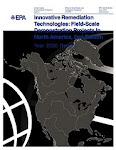2.6.10
The Remediators, Inc.
Our systems employ nature’s own process utilized by mushrooms. Through thousands of lab and field-tested fungi, The Remediators, Inc. selects strains to degrade a wide assortment of soil contaminants. Our process produces no toxic byproducts, which allows the soil to be put back into use quickly.
Our unique process provides customers savings by:
•eliminating fees for removing and trucking away contaminated soils.
•eliminating the need for replacement fill material.
•providing a rapid and safe alternative to costly chemical or biological treatments.
Bioremediation using fungi
Scientific Background
Fungal bioremediation has a long history (1, 2). Many fungi produce enzymes which have the capacity to break down wood. These same enzymes are able to degrade petroleum hydrocarbons and other toxic compounds. The Remediators Incorporated subjects candidate strains of fungi to a series of tests that indicate their potential to degrade a spectrum of toxic compounds under varying soil conditions. We test hundreds of strains of fungi in our labs and have a growing library of fungal strains with abilities proven to degrade a wide variety of contaminants. We have the resources to produce our soil treatments in large quantities. The Remediators has the experience to design, build, and operate specialized machinery to meet unique field conditions.
The Remediators Inc.
Thom O’Dell, Ph.D., Vice President, has a doctorate in Botany and Plant Pathology from Oregon State University. O’Dell served as the Interagency Regional Mycologist, USDA Forest Service PNW Research Station and Program Manager, Northern Colorado Plateau Inventory and Monitoring Network, National Park Service, Moab, Utah. He performs bioassays, and has identified novel fungi through DNA typing. O’Dell is Adjunct Faculty, Department of Biology, Northern Arizona University, Flagstaff , Arizona.
Science Advisors
• Robert Bogar M.S. is a licensed hydrogeologist in Washington, Oregon, and California and a consultant in the environmental industry in Washington, Oregon, and California. Bogar acted as project manager of an EPA Brownfield’s Cleanup Revolving Loan Fund for the cleanup of petroleum contaminated sites in Washington and Oregon coastal areas. Responsibilities have included providing oversight of environmental contractors, interacting with small governments and private parties, and writing technical documents required by EPA. Past projects have included many soil and groundwater remediation projects.
• Edward Schreiner, Ph.D. USGS, research includes 35 years experience in long-term ecological monitoring, and terrestrial plant ecology with the National Park Service and USGS. Editor, Northwest Science 1998-2001. Affiliate Faculty, College of Forest Resources, University of Washington.
• James Trappe, Ph.D. has studied the living soil for 45 years and published over 250 scientific papers on the subject. Trappe is a foremost experts on mycorrhizae (root-fungal symbioses) and mycorrhizal fungi and Courtesy Professor, Department of Forest Science, Oregon State University.
• Terry Anderson Ph.D. Adjunct Professor, Stanford Graduate School of Business, Professor Emeritus, Montana State University, Department of Economics, Executive Director of the Property and Environment Research Center, Bozeman Montana.
• Robert Clement, MBA. provides consulting in the areas of business strategy, business operations, project management, and antitrust economics. Previously, Clement had a 15-year career at Accenture Inc., one of the world's largest technology consulting companies, from which he retired as a partner in 2004.
• Robert McCormick, Ph.D., senior research associate for the Arthur M. Spiro Center for Entrepreneurial Leadership, and Professor, John E. Walker Department of Economics, Clemson University.

